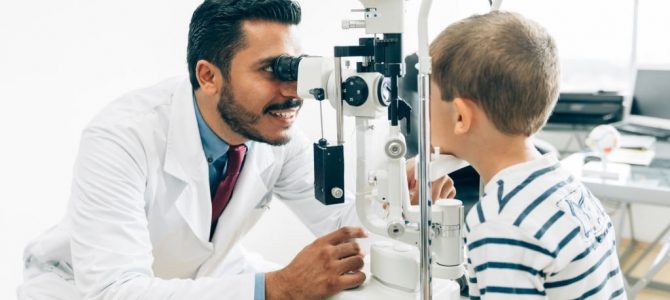Is Refractive Surgery Right for You? Elements to Consider for Better Eyecare
In the realm of eye care, the decision to go through refractive surgery is a significant one that requires thoughtful factor to consider. From the complexities of one's ocular wellness to the details of daily behaviors and individual assumptions, each element holds relevance in the more comprehensive landscape of refractive surgery candidacy.
Eye Wellness Evaluation
When considering refractive surgical treatment, a detailed eye health and wellness assessment is essential to evaluate the viability of the procedure for each person. neurologist andalusia. This analysis involves a series of examinations and assessments carried out by an eye treatment specialist to figure out the general health and wellness of the eyes, the presence of any type of underlying conditions, and the stability of the refractive mistake
During the evaluation, different aspects are taken into consideration, such as the person's case history, existing eye prescription, corneal thickness, student size, and tear movie high quality. These analyses assist to identify any type of contraindications to refractive surgery, such as corneal irregularities, cataracts, or neglected eye infections. Furthermore, the assessment aids to handle patient expectations concerning the possible end results of the surgical treatment based on their one-of-a-kind eye features.
Inevitably, the eye wellness evaluation is crucial in ensuring the security and performance of refractive surgical treatment, as it supplies beneficial understandings right into the person's eye health and wellness standing and assists establish one of the most suitable therapy choices for achieving optimum aesthetic results. (andalusia pediatrics)
Way Of Living Assessment
A detailed way of life evaluation is indispensable in figuring out the viability of refractive surgery for a person's aesthetic correction requirements. Way of life aspects such as profession, hobbies, and day-to-day tasks play a vital role in the decision-making process regarding refractive surgery.
Additionally, lifestyle practices such as sports involvement, outside activities, and even skincare routines can affect the recovery procedure and overall success of refractive surgical procedure. People who involve in call sports might need to take additional precautions to safeguard their eyes throughout the recuperation duration. Furthermore, individuals with considerable sunlight exposure might require extra post-operative like avoid difficulties. By performing a comprehensive lifestyle analysis, eye care professionals can customize their recommendations and therapy strategies to satisfy the distinct needs of each person, eventually bring about boosted visual end results and contentment.
Assumption Alignment

Clients require to comprehend that while lots of people achieve 20/20 vision or much better following refractive surgery, some might still call for glasses for specific activities like analysis or driving at night. Taking care of these expectations helps avoid frustration and frustration post-surgery, leading to a more positive total experience for the patient.
Risk Evaluation

Elements that may enhance the risk of difficulties include age, specific clinical problems like autoimmune diseases, unstable vision prescription, thin corneas, and impractical individual expectations. Additionally, choosing a seasoned and proficient doctor, adhering to pre and post-operative care guidelines diligently, and divulging any relevant medical background can aid mitigate dangers.
To minimize the possibility of issues, eye doctors carry out extensive pre-operative analyses to determine any contraindications to surgery. They also talk about the possible dangers and advantages with people during the assessment process. By participating in open communication and shared decision-making, both the patient and the eye doctor can collaborate to identify if refractive surgery is the appropriate choice based upon specific danger profiles and wanted end results.
Examination Relevance
Considering the important duty of educated decision-making in analyzing dangers and possible difficulties in refractive surgical procedure, the examination process holds considerable relevance in leading individuals in the direction of optimum outcomes. Throughout the examination, the ophthalmologist evaluates the patient's eye health, refractive mistakes, and total suitability for surgical treatment. This preliminary evaluation is essential in establishing the most appropriate procedure for each person, thinking about elements such as corneal thickness, pupil dimension, and existing eye conditions.
Additionally, the examination works as a chance for clients to discuss their expectations, problems, and any kind of concerns they may have pertaining to the surgical treatment. Clear interaction between the client and the specialist is vital to ensure realistic assumptions and a comprehensive understanding of the prospective threats and advantages involved.
Furthermore, the appointment allows the surgeon read here to discuss the various medical alternatives offered, their particular results, and the post-operative care needed. This comprehensive conversation empowers individuals to make knowledgeable decisions about their eye treatment, bring about far better contentment and outcomes Website post-surgery.
Final Thought
To conclude, individuals thinking about refractive surgery needs to go through an extensive eye health evaluation, assess their way of living practices, align their assumptions with prospective end results, assess the connected threats, and focus on consultations with eye care experts. These variables play a crucial duty in figuring out the viability of refractive surgical procedure for every individual, guaranteeing optimal results and satisfaction with the procedure.
Clients thinking about refractive surgical procedure often have high expectations pertaining to the results, anticipating best vision without the requirement for glasses or get in touch with lenses. While refractive surgical procedure can significantly improve vision and reduce dependency on visual help, it is critical for patients to comprehend that results may differ based on private variables such as the degree of refractive mistake, corneal density, and overall eye wellness.
By engaging in open interaction and shared decision-making, both the ophthalmologist and the patient can work together to determine if refractive surgical procedure is the ideal selection based on private threat profiles and desired outcomes.
Thinking about the important function of educated decision-making in evaluating risks and possible problems in refractive surgical procedure, the examination process holds substantial significance in leading individuals in the direction of optimum results. During the examination, the eye doctor examines the person's eye health, refractive errors, and total suitability for surgical procedure.